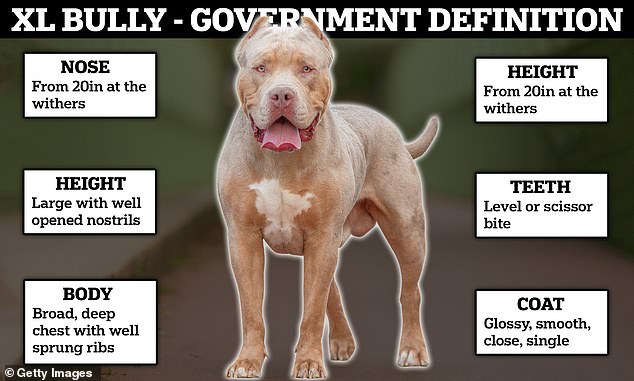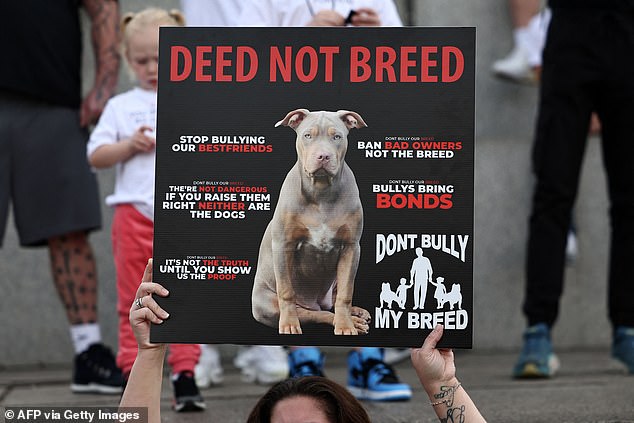[ad_1]
American XL bully dogs are now officially banned – with offences established to outlaw the sale, breeding and giving away of the dogs and walking them off-lead.
The ban was promised by prime minister Rishi Sunak following a spate of high-profile attacks earlier this year including the savaging of an 11-year-old girl and the death of a man in Staffordshire at the hands of two of the dangerous dogs.
Defra says that under the new rules, which come into effect from December 31, it will be illegal to ‘breed, sell, advertise, exchange, gift, rehome, abandon or allow XL Bully dogs to stray’ in England and Wales.
From the same date, existing XL Bully owners must keep their dogs on a lead and muzzled in public; the government is advising people to start training their dogs to wear a muzzle and walk on a lead comfortably, if they aren’t already trained.
And from February 1, owning an XL Bully will be outlawed altogether unless owners register their animal on the Index of Exempted Dogs, as required by the Dangerous Dogs Act, the law under which the breed will be controlled.

The breeding and sale of American XL Bully dogs will be banned by the end of the year – with a ban on keeping them without a certificate following in February

The government says it has ‘staggered’ the dates to give existing owners time to prepare for the laws to come in.
Owners who want to keep their dogs will have until the end of January to register their dogs with the government, and from then on must follow strict rules.
Failing to follow the rules, or failing to register the dog on the index, will see owners potentially face criminal charges and an unlimited fine; their dogs can also be seized under the new laws.
Dogs under one year old when the ban comes in must be neutered by the end of the year, while older dogs must be neutered by June.
Registering the dog on the Index of Exempted Dogs will cost £92.40; all registered owners must be over 16, and the animals must have an insurance policy covering injuries inflicted on other people.
Council dog wardens and police officers will be able to request to see the Certificate of Exemption – failure to do so within five days could lead to enforcement action.
There are already nearly 3,500 illegal dogs in England, Scotland and Wales that have been granted Certificates of Exemption under the Dangerous Dogs Act; the vast majority are pit bull terriers.
The government says it will compensate owners who wish to have their dogs put down before the ban comes into effect. If owners do choose to euthanised their XL Bullies, they can claim £200 compensation to cover the costs.
Guidance has been published for existing owners of XL Bullies to advise them of what needs to be done ahead of time: all dogs matching the definition must be microchipped and neutered.
The government has also published what it says is the official definition of an XL Bully dog under UK law, following consultation with dog experts, vets, police and local councils.
It defines the animal as having ‘a muscular body and blocky head, suggesting great strength and power for its size…(it is a) powerfully built individual.’
Breeders have been given nine weeks to legally sell any puppies that were bred before the legislation was tabled in Parliament today; the government says breeders considering starting a fresh litter should stop now.
The ban comes following a series of high profile attacks on people committed by dogs believed to be XL Bullies.
Ian Price, 52, from Stonnall in Stafordshire, died after he was savaged by two XL Bully dogs in September; Rishi Sunak announced the ban on the mongrel crossbreed a day later.
A 30-year-old man was arrested on suspicion of manslaughter following the attack and released on conditional bail; Staffordshire Police says the investigation is ongoing.

Ian Price, 52, was mauled to death by two XL Bullies on September 14 – the ban on XL Bullies was announced by Rishi Sunak the next day

Ana Paun, 11, was attacked by an XL Bully as she walked home from buying sweets with her sister on September 11 in Birmingham

Jack Lis, 10, suffered fatal head and neck injuries after he was attacked by an XL Bully in Caerphilly in 2021; his mother has since campaigned for the breed to be banned

A mother cradles her 20-month-old that was attacked by an XL Bully in London earlier this month

The government says it is taking ‘quick and decisive action’ on XL Bully dogs to protect the public

Outraged owners took to the streets of London following the news that the breed was set to be banned – but left their animals at home
Days before Mr Price was killed, 11-year-old Ana Paun was mauled by another dog of the same breed as she walked home with her sister after buying sweets in Birmingham.
She said the dog had come at her ‘out of nowhere’ before locking its powerful jaws around her arm. She recalled: ‘I was screaming and screaming – I was petrified.’
In 2021, 10-year-old Jack Lis died from severe head and neck injuries after he was attacked by an XL Bully in Caerphilly; his mother, Emma Whitfield, has campaigned for the dogs to be banned.
In March 2021, 17-month-old Bella-Rae Birch was mauled to death by her family’s XL Bully in St Helen’s.
A number of other attacks said to involve XL Bully-type dogs have occurred since the ban was announced in mid-September.
The latest victim was Ian Langley, 54, a father who died after an attack while walking his puppy in Sunderland on October 3.
And a toddler was attacked by an XL Bully in south-east London the day before – almost losing his leg after the animal sunk its teeth into his leg.
News of plans to introduce a ban was welcomed by many, including Jack Lis’ mother Emma Whitfield, but was opposed by animal charities, who say breed-specific bans are not effective.
The Dog Control Coalition – which is made up of RSPCA, Blue Cross, Battersea, Dogs Trust, Hope Rescue, the Scottish SPCA, The Kennel Club and BVA – said ‘banning the breed will sadly not stop these types of incidents recurring.’
Legal experts, while welcoming the ban, have also expressed concerns over whether the legislation will do enough to protect the public.
Civil litigation and criminal defence lawyer Rhianna Tsiattalou of Stokoe Partnership Solicitors said on Tuesday: ‘If the data available to the government and experts is that these dogs are, in fact, inherently dangerous, then Section 3 of the Dangerous Dogs Act will not go far enough to protect the public.
‘With XL bullies not being an officially recognised breed by the Royal Kennel Club, a ban on these dogs could inadvertently lead to other dog breeds being included under the same category and consequently banned in the UK.
‘While legislation can be black and white, the cross-bred nature of these dogs means that even if this ban comes into force, it would be a challenge to enforce it in every case.’
Dog trading website Puppies.co.uk says it is ‘phasing out’ XL Bully-related listings.
Bosses at the website have warned that people may simply seek out another similar breed of dog when the ban comes into effect with a similar image; the dogs are adored by celebrities as a status symbol because of their stocky build.
A spokesperson for Puppies.co.uk said: ‘People who were buying the XL bully will likely just move to the next dangerous dog breed and the cycle will restart again until that one gets banned.
‘We are calling for the government to consider further laws enforcing responsible ownership and responsible breeding of all dog breeds to be a priority to solve the problem of dangerous dogs once and for all.’
XL Bully owners who insist their animals are not dangerous even took to the streets in protest – but left their pets at home.
Environment Secretary Thérèse Coffey said: ‘We are taking quick and decisive action to protect the public from tragic dog attacks and today I have added the XL Bully type to the list of dogs prohibited under the Dangerous Dogs Act.
‘It will soon become a criminal offence to breed, sell, advertise, rehome or abandon an XL Bully type dog, and they must also be kept on a lead and muzzled in public.
‘In due course it will also be illegal to own one of these dogs without an exemption.
‘We will continue to work closely with the police, canine and veterinary experts, and animal welfare groups, as we take forward these important measures.’
This is a breaking news story – more to follow.
[ad_2]


















